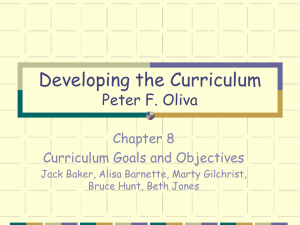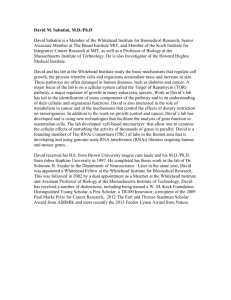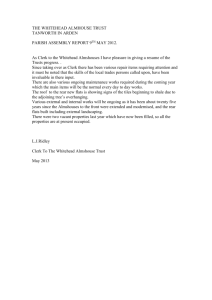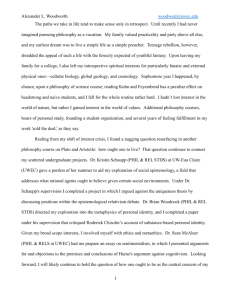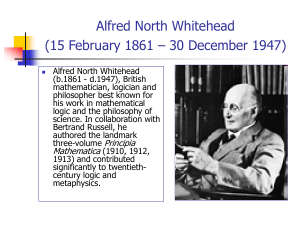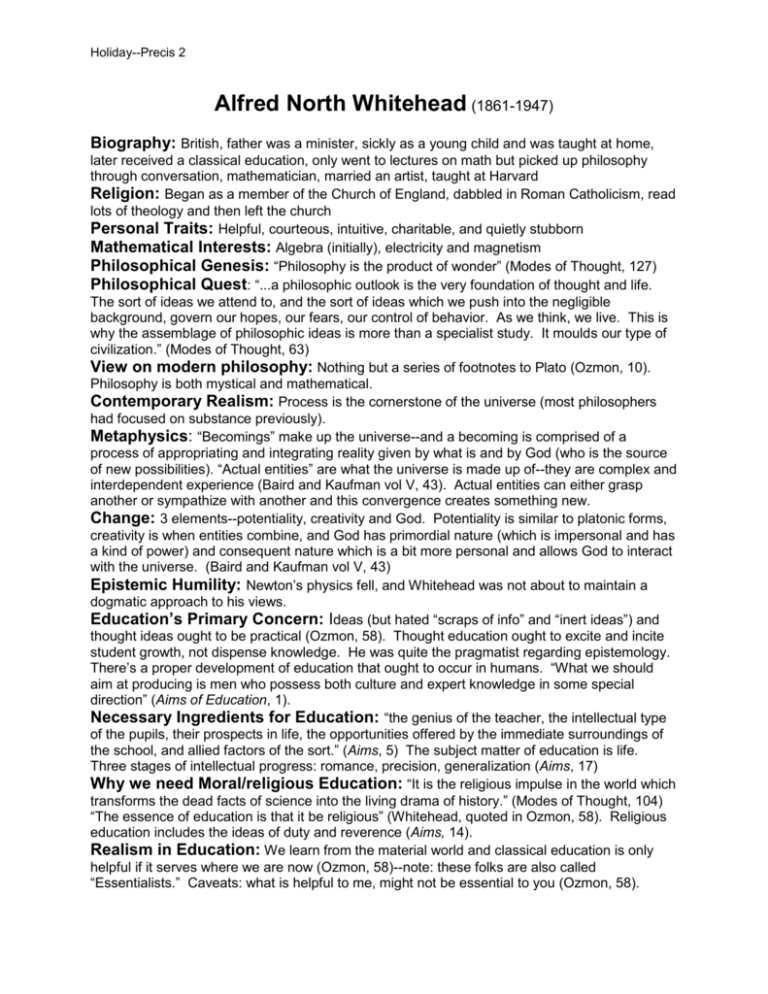
Holiday--Precis 2
Alfred North Whitehead (1861-1947)
Biography: British, father was a minister, sickly as a young child and was taught at home,
later received a classical education, only went to lectures on math but picked up philosophy
through conversation, mathematician, married an artist, taught at Harvard
Religion: Began as a member of the Church of England, dabbled in Roman Catholicism, read
lots of theology and then left the church
Personal Traits: Helpful, courteous, intuitive, charitable, and quietly stubborn
Mathematical Interests: Algebra (initially), electricity and magnetism
Philosophical Genesis: “Philosophy is the product of wonder” (Modes of Thought, 127)
Philosophical Quest: “...a philosophic outlook is the very foundation of thought and life.
The sort of ideas we attend to, and the sort of ideas which we push into the negligible
background, govern our hopes, our fears, our control of behavior. As we think, we live. This is
why the assemblage of philosophic ideas is more than a specialist study. It moulds our type of
civilization.” (Modes of Thought, 63)
View on modern philosophy: Nothing but a series of footnotes to Plato (Ozmon, 10).
Philosophy is both mystical and mathematical.
Contemporary Realism: Process is the cornerstone of the universe (most philosophers
had focused on substance previously).
Metaphysics: “Becomings” make up the universe--and a becoming is comprised of a
process of appropriating and integrating reality given by what is and by God (who is the source
of new possibilities). “Actual entities” are what the universe is made up of--they are complex and
interdependent experience (Baird and Kaufman vol V, 43). Actual entities can either grasp
another or sympathize with another and this convergence creates something new.
Change: 3 elements--potentiality, creativity and God. Potentiality is similar to platonic forms,
creativity is when entities combine, and God has primordial nature (which is impersonal and has
a kind of power) and consequent nature which is a bit more personal and allows God to interact
with the universe. (Baird and Kaufman vol V, 43)
Epistemic Humility: Newton’s physics fell, and Whitehead was not about to maintain a
dogmatic approach to his views.
Education’s Primary Concern: Ideas (but hated “scraps of info” and “inert ideas”) and
thought ideas ought to be practical (Ozmon, 58). Thought education ought to excite and incite
student growth, not dispense knowledge. He was quite the pragmatist regarding epistemology.
There’s a proper development of education that ought to occur in humans. “What we should
aim at producing is men who possess both culture and expert knowledge in some special
direction” (Aims of Education, 1).
Necessary Ingredients for Education: “the genius of the teacher, the intellectual type
of the pupils, their prospects in life, the opportunities offered by the immediate surroundings of
the school, and allied factors of the sort.” (Aims, 5) The subject matter of education is life.
Three stages of intellectual progress: romance, precision, generalization (Aims, 17)
Why we need Moral/religious Education: “It is the religious impulse in the world which
transforms the dead facts of science into the living drama of history.” (Modes of Thought, 104)
“The essence of education is that it be religious” (Whitehead, quoted in Ozmon, 58). Religious
education includes the ideas of duty and reverence (Aims, 14).
Realism in Education: We learn from the material world and classical education is only
helpful if it serves where we are now (Ozmon, 58)--note: these folks are also called
“Essentialists.” Caveats: what is helpful to me, might not be essential to you (Ozmon, 58).
Holiday--Precis 2
Also, students are seen as subordinate to learning goals or curriculum and not as human beings
(Ozmon, 68).
Educational Tidbits: Excellent lecturer; taught in “unpopular” modes--women’s colleges;
while concerned with how mathematics were taught, he also advocated a liberal arts education
as well as technical skills. He advocated for “the joy of discovery” in education (Aims, 2).
Implications for Education: Given his desire to limit systematizing philosophy in favor of
assemblage, that is a helpful crossover for education. “We must be systematic; but we should
keep our systems open” (Modes of Thought, 6). Education ought to create space for wonder
and ought to steward process and creativity well. Education ought to help us live into and
understand our modes of thought (see below) in a manner that we lead us toward both a
pragmatic and meaningful life.
Modes of Thought (1938):
1. Importance (sense and presupposition thereof)--feeling which leads to perspective imposed
on experience (“universe of things felt”). Often we limit importance in thought to morality,
logic, religion and art but of course each has irrelevance sometimes associated with it.
2. Expression--(presupposes Importance) “Expression is the diffusion, in the environment, of
something initially entertained in the experience of the expressor...the impulse to diffuse” (p.
21). “Importance generates interest. Interest leads to discrimination...Finally consciousness
develops, gradually and fitfully; and it becomes another agent of stimulation” (p. 31).
“Language is the systematization of expression” (p. 34)
3. Understanding--made up of composition and unity and attention to process/transition.
“Philosophy is the attempt to make manifest the fundamental evidence as to the nature of
things” (48) and we must be able to understand the evidence.
4. Perspective--involves considering what is “actuality”--there are eternal forms which are either
potential or realized; also there are realized facts which are either “past in the present” or
“immediacy of the present” (85)
5. Forms of Process--Process: creation to pulsation to units of fact. Existence cannot be
abstracted from process. Process and individuality require each other.
6. Civilized Universe--”Actuality in its essence is composition” (119). As we figure out process,
we realize there is a history of factors that make up something new, and there’s also a sense
of unity or “rightness” when something actually happens that conveys value and sacredness.
7. Nature Lifeless--Nature is the interpreted world experienced through senses. As science
progresses, there are gaps and issues with what was thought to be knowledge gained via
common sense. We understand creative activity through process, and activity.
8. Nature Alive--Logical positivism is useless in the real world--man cannot live by facts alone.
Life involves enjoyment, creativity and purpose. “Existence is activity ever merging into the
future.” (p. 169)
Major Works: Principia Mathematica (by A.N. Whitehead and Bertrand Russell 1910);
Enquiry Concerning the Principles of Natural Knowledge (1919); Process and Reality (1929);
Adventures of Ideas (1933); Modes of Thought (1938).
References:
Baird, Forrest E. and Walter Kaufmann. 2000. Twentieth Century Philosophy 2nd Ed. Upper
Saddler River, NJ: Prentice Hall.
Gutek, Gerald L. 1997. A History of The Western Educational Experience 2nd Ed. Prospect
Heights, IL: Waveland Press.
Ozmon, Howard and Samuel Craver. Philosophical Foundations of Education, 8th Ed. Upper
Saddler River, NJ: Pearson Prentice Hall.
Whitehead, Alfred North. Aims of Education.
https://archive.org/details/AlfredNorthWhiteheadAimsOfEducation1967. accessed 1/23/16.
Whitehead, Alfred North. 1966. Modes of Thought. New York: The Free Press.

